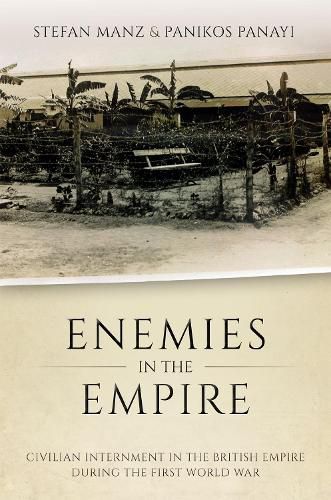Enemies in the Empire: Civilian Internment in the British Empire during the First World War
Stefan Manz (Professor of German and Global History, Professor of German and Global History, Aston University, Birmingham, UK),Panikos Panayi (Professor of European History, Professor of European History, De Montfort University, Leicester, UK)

Enemies in the Empire: Civilian Internment in the British Empire during the First World War
Stefan Manz (Professor of German and Global History, Professor of German and Global History, Aston University, Birmingham, UK),Panikos Panayi (Professor of European History, Professor of European History, De Montfort University, Leicester, UK)
During the First World War, Britain was the epicentre of global mass internment and deportation operations. Germans, Austro-Hungarians, Turks, and Bulgarians who had settled in Britain and its overseas territories were deemed to be a potential danger to the realm through their ties with the Central Powers and were classified as ‘enemy aliens’. A complex set of wartime legislation imposed limitations on their freedom of movement, expression, and property possession. Approximately 50,000 men and some women experienced the most drastic step of enemy alien control, namely internment behind barbed wire, in many cases for the whole duration of the war and thousands of miles away from the place of arrest. Enemies in the Empire is the first study to analyse British internment operations against civilian ‘enemies’ during the First World War from an imperial perspective. The narrative takes a three-pronged approach. In addition to a global examination, the volume demonstrates how internment operated on a (proto-) national scale within the three selected case studies of the metropole (Britain), a white dominion (South Africa), and a colony under direct rule (India). Stefan Manz and Panikos Panayi then bring their study to the local level by concentrating on the three camps Knockaloe (Britain), Fort Napier (South Africa), and Ahmednagar (India), allowing for detailed analyses of personal experiences. Although conditions were generally humane, in some cases, suffering occurred. The study argues that the British Empire played a key role in developing civilian internment as a central element of warfare and national security on a global scale.
This item is not currently in-stock. It can be ordered online and is expected to ship in approx 2 weeks
Our stock data is updated periodically, and availability may change throughout the day for in-demand items. Please call the relevant shop for the most current stock information. Prices are subject to change without notice.
Sign in or become a Readings Member to add this title to a wishlist.


